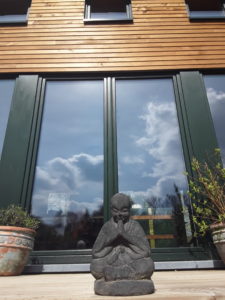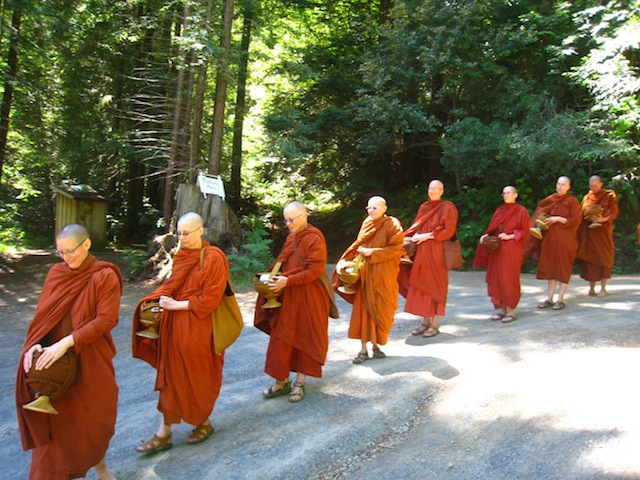Ways to Support
Samita ASBL was set up as a lay organisation to support the Sangha (Monastics) by providing what in Buddhism is known as the “four requisites” i.e. food, shelter, clothing and medicine. The Sangha members have taken a vow of poverty and are not allowed to handle money. They live only from what is given. We do that through fundraising activities and organizing events and retreats and to deal with the financial sides of these four requisites like building and maintaining a monastery. The Sangha are the guardians of the Buddhist texts and have been teaching for over 2000 years for the benefit of all living beings, without receiving any compensation.
If out of gratitude and joy of giving you wish to support the Sangha, there are various ways in which you can help Samita do this.
The bank account for making donations is:
Name: Samita ASBL
IBAN: BE24 5230 8072 9438
BIC: TRIOBEBB
Engreux 49G, 6663 Mabompré, Belgium / Belgien
If you want your donation to be for something specific, please state this when making a donation. (i.e. Tilorien Monastery, a specific event or retreat, support of a Sangha member, etc.).
You can find more information below.
If you live in Germany your donations are tax-deductible. In order for the tax authorities to accept your deduction, you will need to complete the following document Receipt_Samita_DE_template. After completion, please send it to email samitaasbl@gmail.com for signing.
If you live in the Netherlands, your donations are tax deductible. Our ANBI tax number is: 8273 49 026. If you need a receipt for this, please let us know by sending an email to samitaasbl@gmail.com.
Support Samita
If you want to help Samita, you can do so by helping to organise retreats, help with the website or translations. For more information, please write us and let us know what areas you want to help out with.
You can also donate to Samita for organising future retreats. Because our retreats are on donation basis, we often need to pay for venues before donations are received. So in order to do this, we need enough funds to cover the costs. You can contribute to this by donating.
Support Tilorien Monastery
You can support Tilorien Monastery by financial donations or by volunteering your skills or bring or send food or other items for the monastics.
For financial donations, please see the bank details here under or in the right sidebar. If you want to donate for something specific, please mention this in the reference.
If you want to bring food (dana) to the monastery, or send some by post, please see the Monastery page..

Support individual monastics
If you want to support individual monastics with the 4 requisites, travel- or other insurance-expenses, you can donate using the Samita bank account here under and in the right sidebar and mention the name of the monastic and the purpose of the donation.
The Value of Giving
By Ven. Vimala
When I was a child growing up in the Netherlands, we had a traditional celebration called “Sinterklaas” on the 5th December each year. Legend has it that on this day, the evening before his birthday, Sinterklaas himself comes to every house and rewards good children with many presents. His only motivation for this gesture of generosity is simply because he loves to give more than anything else.
Several months before Sinterklaas, everyone in the family would come together to draw a name out of a hat. That was the name of the person you would have to make a creatively disguised gift for, with riddles and poems and sometimes a chase for clues around the house. The Dutch use the french word “surprise” for this special gift.
As a child I loved spending lots of time planning an appropriate “surprise” and working out all the details. It was sheer joy to imagine the look on the person’s face when they would open it, read the poem, try to find all the little clues and gifts. It was the joy of giving. There was so much more joy in that than just unwrapping your own presents.
That annual tradition gave me a lesson I will never forget; the joy of generosity.
When I first ordained in a monastery near a poor village in Burma in 2008, I would go with the monks on almsround. As a nun, I was not allowed to carry a bowl myself, but it was an utter joy to see these very poor people come out of their bamboo huts, with little children and a huge smile on their face, so happy just to share a spoonful of their rice with the monks. Mothers would lift up small children so they too would be able to give some rice into the bowls. Despite the fact that they hardly had anything themselves, they understood that sharing the little they had would give a lot of joy.
That joy is what trains the mind to be selfless and kind without expecting anything in return. As a result, the mind becomes serene.

Bhikkhuni gathering at Aranya Bodhi Hermitage, June 2013
From the time of the Buddha to the present day, Buddhist monastics dedicate their lives to the preserving and teaching the Dhamma without expecting anything in return. That is how the Buddha set up the Sangha. According to the Buddhist scriptures, monastics live without handling money and without an income; they rely solely on the kind, good-hearted donations of others, be it material donations, or the donation of time by by helping out as a volunteer. Buddhist monasteries, therefore, are also entirely maintained through the generosity of supporters. They provide a place for monastics to practise and teach, and for lay people to come and hear the Dhamma.
The Buddha said:
“Bhikkhus, if beings knew, as I know, the result of giving and sharing, they would not eat without having given, nor would they allow the stain of meanness to obsess them and take root in their minds. Even if it were their last morsel, their last mouthful, they would not eat without having shared it, if there were someone to share it with. But, bhikkhus, as beings do not know, as I know, the result of giving and sharing, they eat without having given, and the stain of meanness obsesses them and takes root in their minds.”
Itivuttaka 26
By giving with a good heart, with the right intention, without expecting anything for oneself, but just out of the sheer joy of giving, it teaches the mind a lesson that cannot be overestimated. It teaches the mind to let go, to be selfless and kind. This is real happiness. This is the foundation of the path of Buddhism.
Through this system of interdependence between monastics and lay practitioners, the Dhamma has been able to come to us in an unbroken lineage for over 2500 years. Through this teaching of selfless generosity, we can develop and gladden our minds and develop meditation. It teaches us how to let go of the fear of not having enough, and it teaches us that we are part of a bigger whole.
This is why I have devoted my life to spreading the Dhamma, both by working for SuttaCentral.net and by establishing Tilorien Monastery.


 Deutsch
Deutsch Français
Français Nederlands
Nederlands